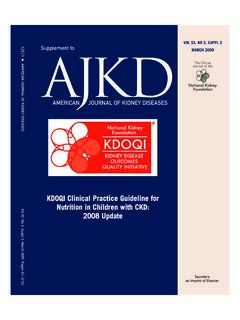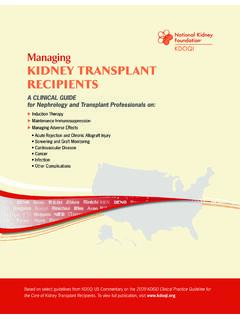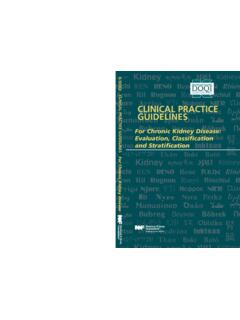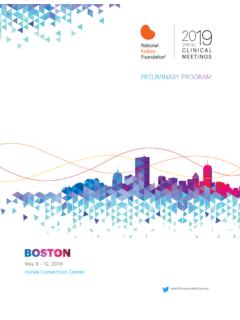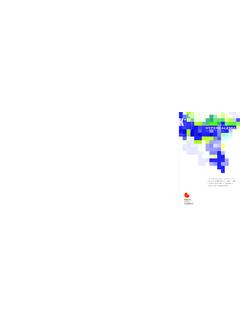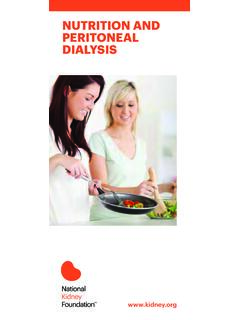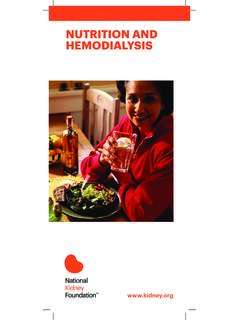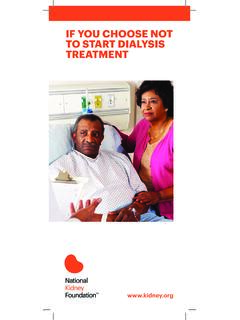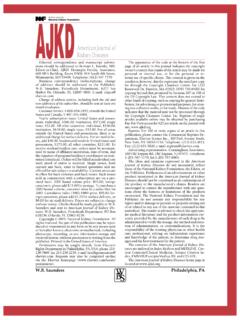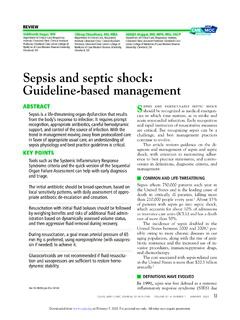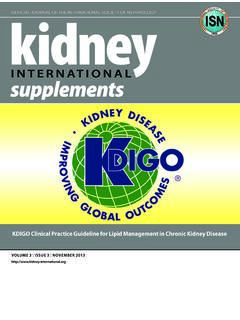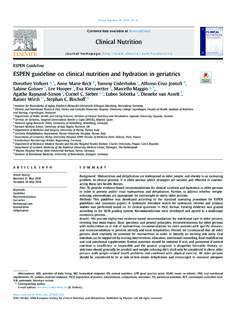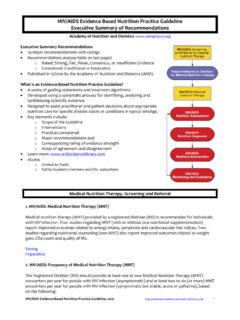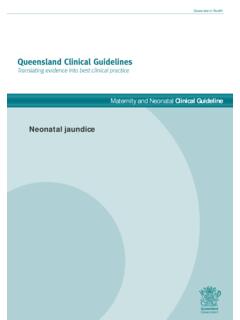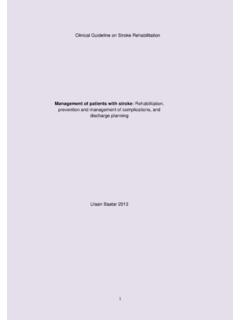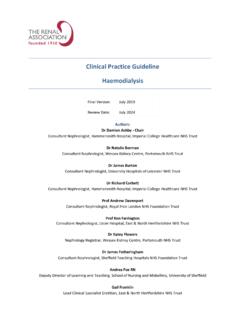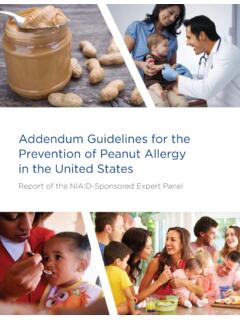Transcription of CLINICAL PRACTICE GUIDELINE FOR NUTRITION IN …
1 GUIDELINE on NUTRITION in CKD Page 1 CLINICAL PRACTICE GUIDELINE FOR NUTRITION IN CHRONIC KIDNEY DISEASE: 2019 UPDATE Public Review DRAFT October 2019 GUIDELINE on NUTRITION in CKD Page 2 SECTION I: USE OF THE CLINICAL PRACTICE GUIDELINE This CLINICAL PRACTICE GUIDELINE document is based upon the best information available as of April 2017*. It is designed to provide information and assist decision making. It is not intended to define a standard of care, and should not be construed as one, nor should it be interpreted as prescribing an exclusive course of management. Variations in PRACTICE will inevitably and appropriately occur when clinicians take into account the needs of individual patients, available resources, and limitations unique to an institution or type of PRACTICE . Every health-care professional making use of these recommendations is responsible for evaluating the appropriateness of applying them in the setting of any particular CLINICAL situation.
2 The recommendations for research contained within this document are general and do not imply a specific protocol. *Commissioned evidence review included articles published through April 2017. Consensus opinion statements use literature published though August 2018. SECTION II: DISCLOSURE Kidney Disease Outcomes Quality Initiative (KDOQI) and American Academy of NUTRITION and Dietetics (AND) make every effort to avoid any actual or reasonably perceived conflicts of interest that may arise as a result of an outside relationship or a personal, professional, or business interest of a member of the Work Group. All members of the Work Group are required to complete, sign, and submit a disclosure and attestation form showing all such relationships that might be perceived or actual conflicts of interest. All reported information will be printed in the final publication and are on file at the National Kidney Foundation (NKF).
3 GUIDELINE on NUTRITION in CKD Page 3 TABLE OF CONTENTS Table of 4 Table of 4 Abbreviations and 5 Work Group 8 Organization 9 NA NA 10 Summary of GUIDELINE 25 GUIDELINE 1: 36 Usual Care Statements .. 36 Technical Devices & Anthropometric Measurements to Measure Body Composition .. 36 Laboratory Measures of Body Composition .. 50 Handgrip Strength .. 57 Methods to Assess Energy Requirements .. 59 Composite Nutritional Indices to Measure Nutritional Status in CKD Patients .. 62 Tools/Methods Used to Assess Protein Intake and Calorie Intake .. 71 GUIDELINE 2: Medical NUTRITION 74 GUIDELINE 3: Dietary Protein and Energy 82 Energy Intake .. 82 Protein Amount .. 82 Protein Type .. 94 Dietary patterns (Fruits and Vegetables; Mediterranean) .. 98 GUIDELINE 4: Nutritional Supplementation .. 103 NUTRITION Supplementation - Oral, Enteral, and Parental NUTRITION .. 103 NUTRITION Supplementation - 115 Long Chain Omega-3 Polyunsaturated Fatty Acids.
4 119 GUIDELINE 5: 128 General Guidance .. 128 Folic acid (with and without other B Vitamins) .. 132 Vitamin C .. 137 Vitamin D .. 142 Vitamin E and A .. 148 Vitamin K .. 155 Selenium and 159 GUIDELINE 6: 164 Acid-Base .. 164 Calcium .. 171 Phosphorus .. 175 Potassium .. 184 Sodium .. 188 Biographic and Disclosure 196 206 GUIDELINE on NUTRITION in CKD Page 4 TABLES Table 1. Key Questions for Evidence Review .. 16 Table 2. Evidence Review Inclusion and Exclusion Criteria .. 18 Table 3. Quality of Evidence Grades .. 24 Table 4. Implications of strong and weak recommendations for different users of guidelines .. 25 FIGURES Figure 1. Flow diagram of identified studies for Assessment questions .. 21 Figure 2. Flow diagram of identified studies for Intervention questions .. 22 GUIDELINE on NUTRITION in CKD Page 5 ABBREVIATIONS AND ACRONYMS ACE Angiotensin converting enzyme inhibitors APD Animal-based Protein Diet AND Academy of NUTRITION and Dietetics ARB Angiotensin II receptor blocker BF Body fat BIA Bio-electrical impedance analysis BMI Body mass index BP Blood pressure BPI Body protein index CAPD Continuous ambulatory peritoneal dialysis CIMT Constraint induced movement therapy CK Creatinine kinase CKD Chronic kidney disease CRP C-reactive protein CVD Cardiovascular disease DBP Diastolic blood pressure DEXA Dual-energy X-ray absorptiometry eGFR Estimated glomerular filtration rate EAAs Essential amino acids ESRD End-stage renal disease FM Fat mass FFM Fat free mass FSA Four-site skinfold anthropometry GFR Glomerular filtration rate GNRI Geriatric NUTRITION Risk Index GRADE Grades of Recommendation Assessment, Development.
5 And Evaluation HD Hemodialysis HDL-C High-density lipoprotein cholesterol HGS Handgrip Strength HOMA-IR Homeostatic Model Assessment of Insulin Resistance HR Hazard ratio hsCRP High sensitivity C-reactive protein IBW Ideal body weight IDPN Intradialytic parenteral NUTRITION IL-6 Interleukin IMT Intima media thickening IV Intravenous GUIDELINE on NUTRITION in CKD Page 6 KA Ketoacid KAA Ketoacid analogue KDIGO Kidney Disease: Improving Global Outcomes KDQOL-SF Kidney disease quality of life short form KDOQI Kidney Disease Outcomes Quality Initiative KQ Key question LBM Lean body mass LDL-C Low-density lipoprotein cholesterol LPD Low protein diet MAMC Mid-arm muscle circumference MF-BIA Multi-frequency-bio-electrical impedance analysis MGP Matrix Gla protein MHD Maintenance hemodialysis MHDE Maintenance Hemodialysis Equation MIS Malnutrition Inflammation Score MNA Mini- NUTRITION assessment MNA-SF Mini- NUTRITION Assessment-Short Form MST Malnutrition Screening Tool MUST Malnutrition Universal Screening Tool NEAAs Non-essential amino acids NEAP Net endogenous acid production NHANES National Health and NUTRITION Examination Survey NIS NUTRITION Impact Symptoms NKF National Kidney Foundation NRCT Non-randomized controlled trial nPCR Normalized protein catabolic rate nPNA Normalized protein nitrogen appearance NST NUTRITION Screening Tool ONS
6 Oral nutritional supplements PCR Protein catabolic diet PD Peritoneal dialysis PEW Protein energy wasting PNA Protein nitrogen appearance PNI Protein NUTRITION Index RCTs Randomized controlled trials RDN Registered dietitian nutritionist REE Resting energy expenditure R-NST Renal- NUTRITION Screening Tool RRT Renal Replacement Therapy GUIDELINE on NUTRITION in CKD Page 7 SBP Systolic blood pressure SGA Subjective Global Assessment SKF Skinfold thickness SR Systematic review TBF Total body fat TG Triglycerides TNF-a Tumor Necrosis Factor alpha TSF Triceps skinfold thickness VPD Vegetable proteindiet VLPD Very low protein diet vs. Versus GUIDELINE on NUTRITION in CKD Page 8 WORK GROUP MEMBERSHIP Work Group Co-Chairs T. Alp Ikizler, MD Vanderbilt University Medical Center Nashville, TN, USA Lilian Cuppari, PhD Oswaldo Ramos Foundation-Hrim Federal University of Sao Paulo S o Paulo, Brazil Work Group Jerrilynn Burrowes, PhD, RD, CDN Long Island University Brookville, NY, USA Laura Byham-Gray, PhD, RD, CDN Rutgers University Newark, NJ, USA Katrina Campbell, PhD Bond University Robina, Queensland, Australia Juan Jesus Carrero, Pharm, PhD Pharm, PhD Med Karolinska Institutet Stockholm, Sweden Winnie Chan, PhD, RD Queen Elizabeth Hospital Birmingham Birmingham, United Kingdom Denis Fouque, MD, PhD University Claude Bernard Lyon Lyon, France Allon Friedman, MD, FASN Indiana University Carmel, Indianapolis, IN, USA Sana Ghaddar, PhD, RDN DaVita San Francisco, CA, USA Jordi Goldstein-Fuchs, DSc, APRN-C, RD Sierra Nevada Nephrology Consultants Reno, NV, USA George Kaysen, MD.
7 PhD University of California-Davis, Davis, CA, USA Joel Kopple, MD Lundquist Institute for Biomedical Innovation at Harbor-UCLA Medical Center and UCLA Torrance, CA, USA Daniel Teta, MD, PhD Lausanne University Lausanne, Switzerland Angela Yee-Moon Wang, MD, PhD University of Hong Kong Hong Kong Evidence Review Team Deepa Handu, PhD, RD, LDN Academy of NUTRITION and Dietetics Chicago, IL, USA Mary Rozga, PhD, RDN Academy of NUTRITION and Dietetics Chicago, IL, USA GUIDELINE on NUTRITION in CKD Page 9 KDOQI and Academy GUIDELINE Development Staff Kerry Willis, PhD National Kidney Foundation New York, NY Jessica Joseph, MBA National Kidney Foundation New York, NY Laura Brereton, MSc National Kidney Foundation New York, NY Tom Manley, RN, BSN National Kidney Foundation New York, NY Alison Steiber, PhD, RDN Academy of NUTRITION and Dietetics Chicago, IL, USA Mary Rozga, PhD, RDN Academy of NUTRITION and Dietetics Chicago, IL, USA Deepa Handu, PhD, RDN, LDN Academy of NUTRITION and Dietetics Chicago, IL, USA Organizational Leadership Academy of NUTRITION and Dietetics KDOQI Alison Steiber, PhD, RDN Chief Science Officer Michael Rocco, MD, MSCE KDOQI Chair Holly Kramer, MD Vice Chair, Research President, National Kidney Foundation Bernard Jaar, MD MPH Vice Chair, Education Michael J.
8 Choi, MD Vice Chair, Policy Past President, National Kidney Foundation GUIDELINE on NUTRITION in CKD Page 10 METHODS The GUIDELINE Development Process According to the Institute of Medicine (National Academy of Sciences), CLINICAL PRACTICE guidelines are statements that include recommendations intended to optimize patient care that are informed by a systematic review of evidence and an assessment of the benefits and harms of alternative care options . This chapter describes the process and methods used to conduct comprehensives systematic reviews and how the findings from these systematic reviews were used to develop CLINICAL PRACTICE NUTRITION guidelines for patients with chronic kidney disease. These guidelines were developed according to the Standards for Developing Trustworthy CLINICAL PRACTICE guidelines as stated by Institute of Medicine. Development of these guidelines was a collaborative process between National Kidney Foundation (NKF) and the Academy of NUTRITION and Dietetics (Academy).
9 NUTRITION and its management are an integral aspect of care for patients with kidney disease. Due to recent developments in the literature regarding treatment and assessment of CKD, the Academy and NKF collaborated to merge, update and expand the current 2010 Evidence Analysis Library (EAL ) CKD guidelines and the Kidney Disease Outcomes Quality Initiative (KDOQI) NUTRITION guidelines . Hence, the objective of this initiative is to provide medical NUTRITION therapy (MNT) guidelines for patients with chronic kidney disease (CKD) to assess, prevent and treat protein-energy wasting, mineral and electrolyte disorders, and other metabolic co- morbidities associated with CKD. Overview of the GUIDELINE development process: GUIDELINE development is a detailed and comprehensive process. The steps followed to develop this GUIDELINE are below (some steps were completed concurrently): 1. Select the Work group or expert panel that works with the evidence review team.
10 2. Orient the work group the 5-step systematic review process of the Academy of NUTRITION and Dietetics Evidence Analysis Center. 3. Develop research questions, inclusion and exclusion criteria and a detailed search plan as well as identify interventions and outcomes of interest. GUIDELINE on NUTRITION in CKD Page 11 4. Search multiple databases based on search plan. 5. Screen abstracts and full text articles based on a priori eligibility criteria. 6. Extract data and critically assess the quality of included studies (risk of bias of studies) 7. Synthesize evidence narratively (evidence summary and conclusion statements) and in table format (Study characteristics and findings table). Grade the quality of evidence for each outcome and provide GRADE tables. 8. Develop recommendation statements based on the findings of the systematic review and other important considerations and assign strength of recommendation.
